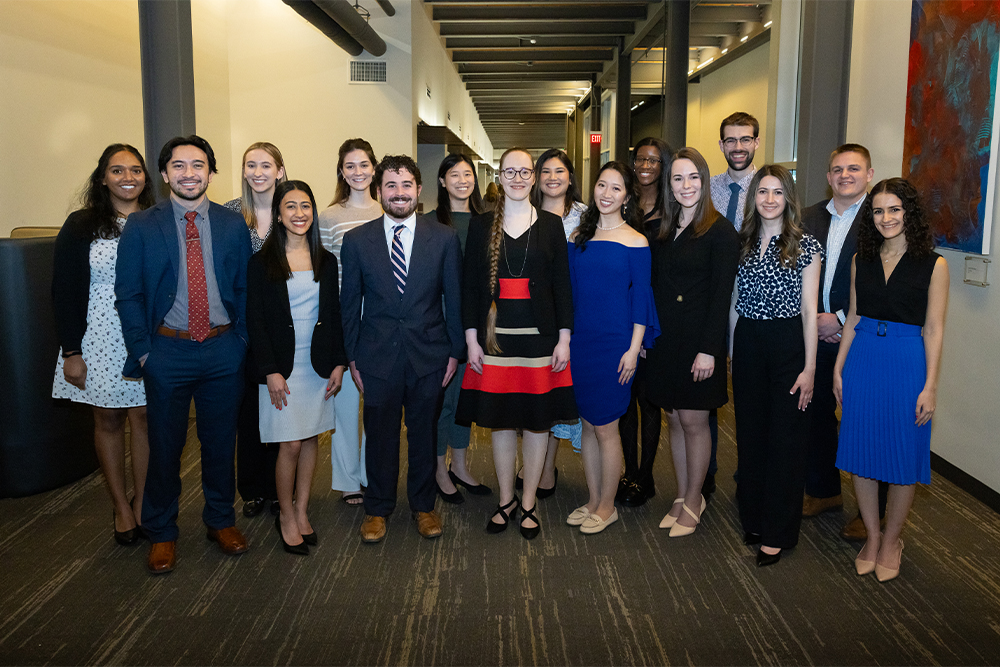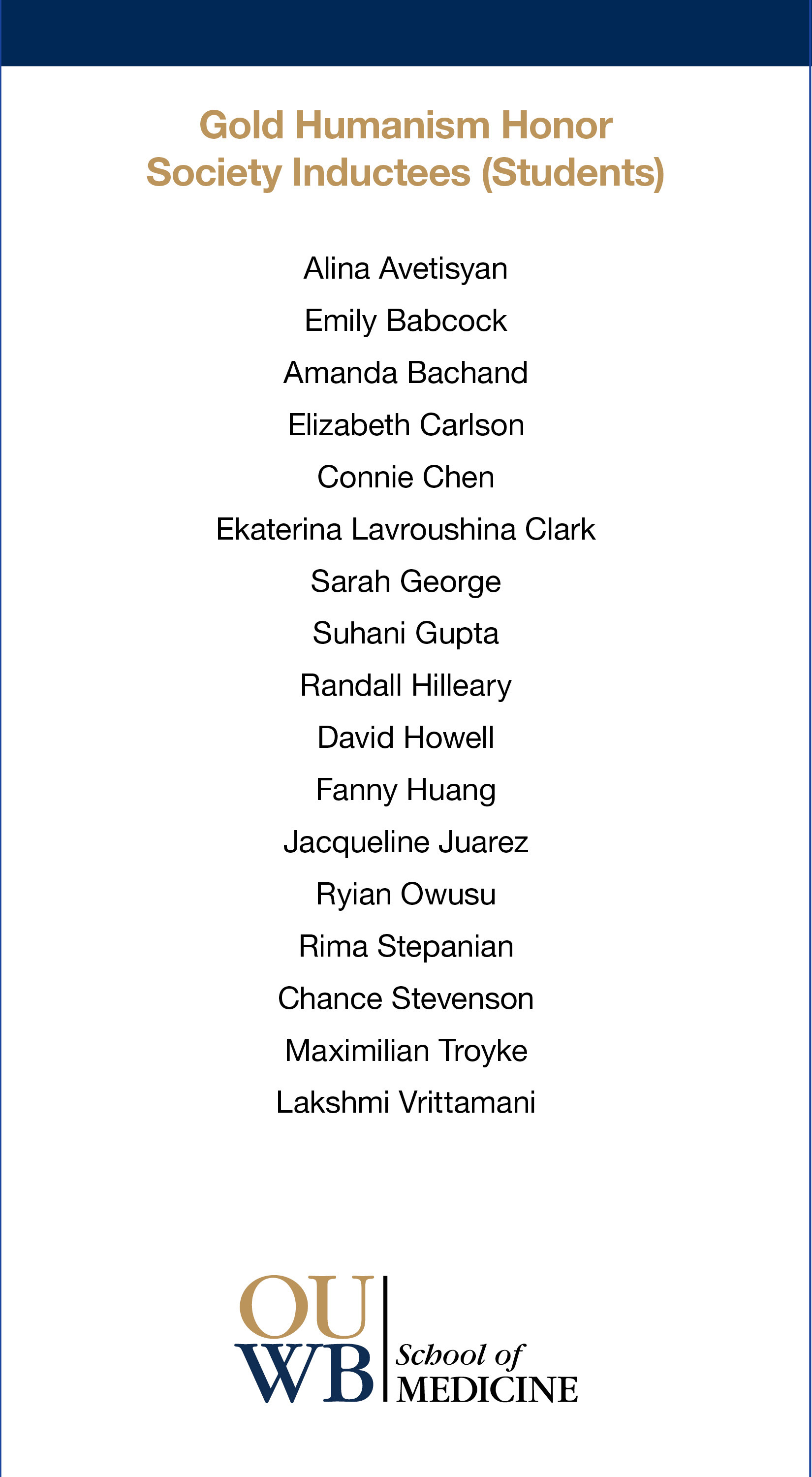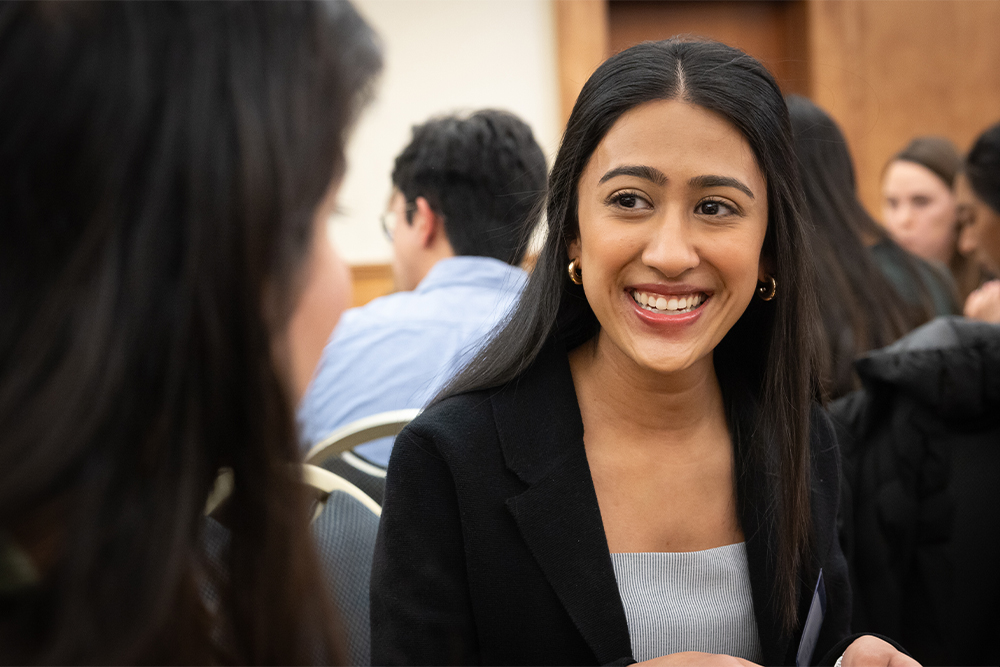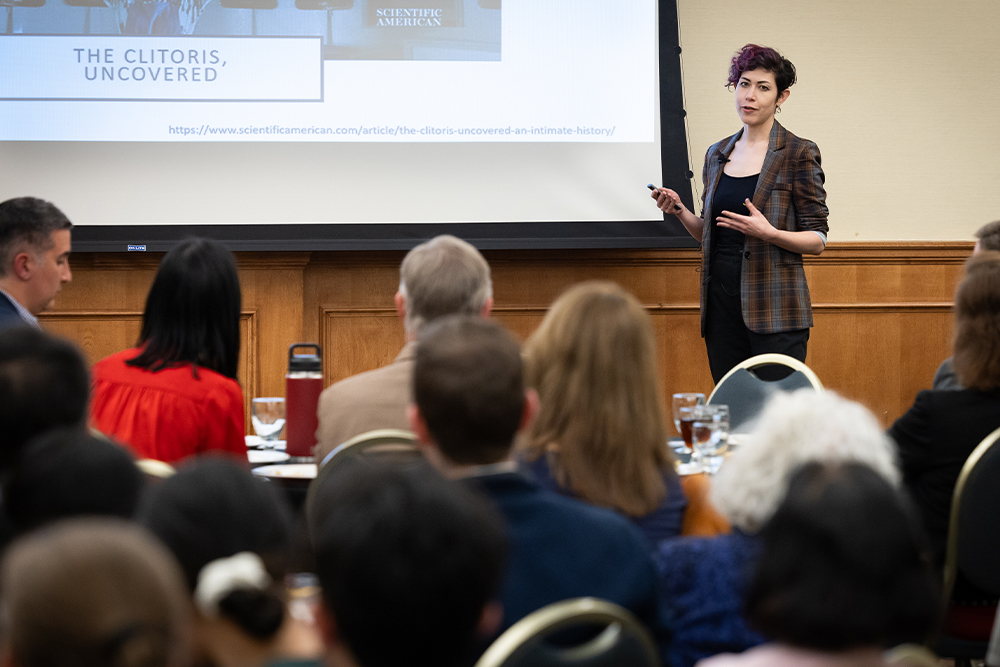
Seventeen third-year medical students from Oakland University William Beaumont School of Medicine recently were inducted into the Gold Humanism Honor Society.
The 10th Annual Faircloth Evening of Medical Humanism was attended on March 7 by more than 100, both in-person on the campus of Oakland University and online.
The event was co-sponsored by OUWB and Oakland University School of Education and Human Services (SEHS) and included induction of OUWB medical students into the Gold Humanism Honor Society (GHHS) (see sidebar), presentation of awards to students from the Department of Counseling, and recognition of recipients of the Leonard Tow Humanism in Medicine Award. Rachel E. Gross, an award-winning journalist, was guest speaker.
The evening is dedicated to Patrick Faircloth, Ph.D., an Oakland University alumnus, who created an endowment for OUWB and SEHS to ensure that students study communications and interpersonal skills as part of their training to be compassionate physicians.
Christopher Carpenter, M.D., Stephan Sharf interim dean, welcomed everyone and called it a privilege to celebrate the partnership between OUWB and SEHS.
“(Faircloth) established this endowment after his experiences with medicine toward the end of his father’s life…experiences that led him to believe that medical experts would benefit greatly from learning to strengthen their communication and interpersonal skills,” said Carpenter. “This evening is dedicated to that realization, which occurred at the time OUWB was formed.”
Carpenter thanked the entire Faircloth family for supporting the event and the GHHS inductees, who he called “exemplars of humanism in service to others.”
‘Very humbling’
 Jason Wasserman, Ph.D., professor, Department of Foundational Medical Studies and Department of Pediatrics, OUWB — and Faircloth coordinator — introduced the current executive leadership team of OUWB’s Gold Humanism Honor Society chapter. They are M4s Adel Andemeskel, Oyinkansola Akinpelu, and Divyani Patel — inducted into GHHS in 2023.
Jason Wasserman, Ph.D., professor, Department of Foundational Medical Studies and Department of Pediatrics, OUWB — and Faircloth coordinator — introduced the current executive leadership team of OUWB’s Gold Humanism Honor Society chapter. They are M4s Adel Andemeskel, Oyinkansola Akinpelu, and Divyani Patel — inducted into GHHS in 2023.
Patel explained that GHHS is a community of medical students, resident physicians, and faculty who practice compassionate patient care and who have been recognized as role models, mentors, and leaders in medicine.
“(GHHS) reinforces and supports that human connection in medicine,” she said. “It encourages working toward greater community service goals and leading initiatives that really foster humanism in medicine.”
Inductees are nominated by their peers. For this year, members of OUWB’s Class of 2025 were asked to nominate those they felt demonstrated empathetic patient care and an unwavering dedication to humanism and professionalism in medicine.
Of those nominated, 30% were asked to submit a personal statement on what humanism means to them along with a letter of recommendation from a physician who could speak to each nominee’s clinical skills and commitment to community.
Finally, of those who submitted the requisite materials, half — or 17 — were chosen for induction by the OUWB GHHS executive board.
Suhani Gupta, M3, was among the inductees, and called it “an incredible honor.”
“The values of compassion and humanism are my priority in medicine, and ones I strive to carry forward with me in every aspect of my life,” she said. “I am so humbled to be a part of this community and to grow alongside students who I know are dedicated to providing empathetic care to their patients.”
Suhani Gupta, M3, was among the inductees. |
Max Troyke, M3, also was inducted.
“It’s a very humbling honor to be here,” he said. “The classmates who are here with me are people I hold in very high esteem. It’s a very special feeling.”
Students also spoke on how — when they become doctors in about a year — they will continue to apply what led to them to become GHHS inductees.
“These core principles are not just important in medical school,” said Jacqueline Juarez, M3. “To be recognized (as GHHS inductees) we’re held to a higher standard and want to follow through by treating patients for who they are as people and with compassion and empathy.”
Rima Stepanian, M3, shared similar thoughts after she called being inducted “very humbling.”
“(Being a GHHS inductee) really ties back into the core of why the field of medicine exists…service to others,” she said.
Alina Avetisyan, M3, said induction into GHHS has been a full circle moment for her.
“Reflecting back on all of the patient experiences we’ve had over the past year and all of the moments where we (as physicians) will be able to connect with patients and serve our community…it’s reminded me of why I chose to pursue a career in medicine,” she said.
‘Change is going to happen’
Rachel E. Gross, a science journalist who has written for the likes of The New York Times, speaks during the Faircloth event. |
The Faircloth Evening of Medical Humanism traditionally features a guest speaker.
This year it was Rachel E. Gross, a science journalist who has written for the likes of The New York Times.
Her presentation was called, “The Forgotten Organ: Anatomy, Medicine, and the Marginalization of Female Sexuality.”
It examined the history of the clitoris in western medicine, how the crucial organ has been erased, ignored, and pathologized, and how that history has shaped today’s gynecological care.
“I do hope to make you uncomfortable,” she said at the beginning of her presentation. “But also, perhaps make you laugh and think…maybe all at the same time.”
Gross walked the audience through the history of understanding — and mostly misunderstanding — of the clitoris, noting that it wasn’t until the 1990s that the first modern mapping of the organ was completed.
She said the general lack of understanding throughout history has led to “concrete consequences for patients, doctors and medical research.”
Gross also talked about the medical language that has been inherited from this long legacy and how it impacts the relationship between doctors and patients.
She applauded OUWB and SEHS for embracing the subject openly.
“It’s always been my dream to be talking to future doctors and counselors and nurses because I really think that’s where change is going to happen in the fields that I write about,” said Gross.
For more information, contact Andrew Dietderich, marketing writer, OUWB, at [email protected].
To request an interview, visit the OUWB Communications & Marketing webpage.
This work is licensed under a Creative Commons Attribution-NonCommercial 4.0 International License.



